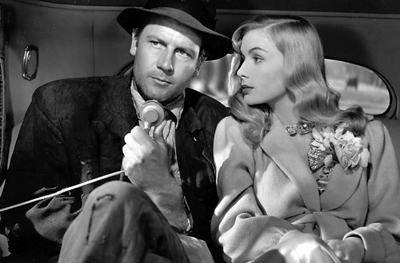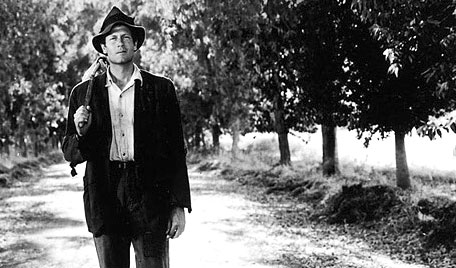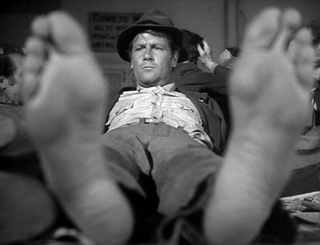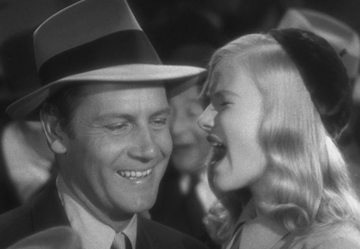Reviewed by Glenn Erickson
One of the best side benefits to being a UCLA film student in the early 1970s was the UCLA Film Archive, which soon took curatorship of the vintage studio print inventories for both 20th-Fox and Paramount. We saw fantastic nitrate prints of an incredible variety of films, from von Sternberg's Shanghai Express to Erle C. Kenton's Island of Lost Souls. The collections contained perfect I.B. Tech original copies of The Gang's All Here, Forever Amber and Doctor Cyclops. We even saw the experimental Technicolor final reel of House of Rothschild, with Boris Karloff.
One Spring quarter, associate professor Robert Epstein showed all of the films of Preston Sturges, the Paramount prodigy who was the first major screenwriter to break the barrier and direct his own scripts. Although John Huston and Billy Wilder soon followed, Sturges' writing-directing career was completely unique, a fantastic flash of brilliance that lasted only a few years.
Sullivan's Travels is Preston Sturges' most talked-about show because it's a self-conscious satire of Hollywood and as such perhaps a bit autobiographical. This comedy about a perplexed movie director unsure about his next film was made a full twenty years before Federico Fellini indulged his personal neuroses in Otto e mezzo.

The one thing common to all of Sturges' Paramount films is flat-out hilarity. Unless one is physically incapable of recognizing real human beings in a B&W picture, there's no need to read about a Sturges picture beforehand: just find a way to see one. They work whether one is alone or in a theater with 1,000 laughing people. Savant's mission in this review is just to assure the reader that Arrow's new Blu-ray release does the movie justice.
Weary of making popular but frivolous comedies, successful Hollywood director John L. Sullivan (Joel McCrea) dresses up as a hobo and leaves his mansion in search of real misery, so as to gain the appropriate life experience to make a deep-dish film version of his favorite socially-conscious book, 'O Brother, Where Art Thou?' Sullivan's 'on the road' efforts are frustrated by the Hollywood entourage that shadows him, in a large van. The director makes several attempts to shake his minders, including a wild ride in a small kid's homemade hot rod. Sullivan chances to meet a washout would-be starlet (Veronica Lake) on her way home to The Stix. She becomes his companion on a second trip through the hobo world. All goes well until a twist of fate sees the innocent Sullivan sentenced to a chain gang, where his plea that he's really a big shot director falls on deaf ears. The people depending on him back in Tinseltown think he's dead!
Preston Sturges at his best is nothing short of amazing. His sparkling dialogue is some of the most refreshing to be found in movies of any era. Joel McCrea is as brilliant here as he is in The Palm Beach Story (perhaps the plain funniest of the Sturges bunch), yet he's only the topliner in an ensemble that can boast twenty delightful, memorable parts. Billed only as 'The girl', Veronica Lake gets mileage out of corny laughs, such as sneeze-talking with a snootful, or discovering herself infested with fleas. The secondary parts are nigh perfect. Sullivan's chauffeur (Frank Moran) corrects William Demarest's grammar in a wonderfully gravelly voice. Sullivan's producers tell tall tales about their tough childhoods in an attempt to bring Sullivan back to reality. A charmless widow (Esther Howard) tries to turn hobo Sullivan into a lover. Chain gang trusty Jimmy Conlin tells the timeless tale of the convict who dreamed he was Charles Lindbergh, and flew away every night when he went to sleep. Portly butler Robert Greig stops the show with his sober, reasoned protest against Sullivan's insensitive plans to exploit the poor... he says it in such a way to suggest an unspoken personal depth to his character.

Critic James Agee could be tough on the best of directors. He loved Sturges but deplored his reliance on low slapstick comedy. Reconciling the obviously cultured filmmaker with his carefree, lowbrow tastes has been a theme of critics ever since. The film's biggest laughs are often its corniest physical gags, such as the cook (Charles Moore) crashing around in the careering bus, or a photo that changes expression every time Sullivan looks at it. Sturges has a thorough understanding of film comedy, from silent shenanigans to fast-talking screwball dialogue. His dream project Mad Wednesday was born out a desire to work with Harold Lloyd. Sturges' satire has a smile, and his irony has not a hint of cynicism. Of all his pictures Sullivan's Travels is perhaps is the most sentimental. What other film ends with its hero saying, "Gee Whiz", yet is not the slightest bit dated?
It's interesting that some people think that Sturges' Sullivan is far too naïve to be a Hollywood film director. Well, Sturges himself later decided that it would be a great idea to go into business with Howard Hughes, as they saw things eye to eye and he was promised no interference and total support. Sullivan would never have been so foolish.

Sullivan's Travels is more sophisticated than it lets on. Sturges' first scene makes a strong distinction between highbrow socially conscious 'cinema' and common entertainment 'for the masses.' Then he rolls both kinds of movie into one. In this hilariously apt film-within-a-film prologue, two swarthy thugs called Capital and Labor sink without a trace into inky depths, like Dracula and the Wolf Man. Sullivan feels humiliated putting his name on shows like Hey Hey in the Hayloft, yet finds himself captivated by something as non-intellectual as a Disney cartoon about Pluto the Dog. Sturges' message is an emphatic endorsement of simple entertainment. Mindless comedies have value because even people with 'grim death gargling in their faces' sometimes need a good laugh. By the end of the show, we're with him all the way.
Arrow Academy's Region B Blu-ray of Sullivan's Travels is a fine B&W encoding of this Paramount picture, now controlled by Universal. A few hairline scratches appear near the ends of reels, but film texture, detail and contrast are excellent. The HD transfer is said to be new; the mono sound is uncompressed. 1
The extras add some nice items to Criterion's old DVD, from 2001. The audio commentary is by Terry Jones of Monty Python, and English writer-broadcaster Kevin Jackson hosts a lengthy appreciation of the film, with many clips. The other newly produced extra is a biographical roundup of Preston Sturges' stock company. What strikes us now is the age of the players - almost all were in their forties. Sturges drew from talent with deep roots in stage and vaudeville work.

Safeguarding Military Information is a home front propaganda short subject with Walter Huston lecturing on the importance of keeping mum about war secrets. It is said to have been written by Sturges. A foolish sailor blabbing about a ship's sailing time is played by none other than Eddie Bracken, who would soon figure big in Sturges comedies. A trailer is included as well.

Repeating from the Criterion disc is a 76-minute American Masters TV docu The Rise and Fall of Preston Sturges. The superior show fully explains Sturges' high throne in American movies, and the curious way in which he dropped off the show business map. It is written by Todd McCarthy and narrated by Fritz Weaver.
A forty-page color disc booklet contains absorbing essays by Peter Swaab, Michael Brooke and Geoff Brown, original reviews from 1942, and an article by Preston Sturges.
On a scale of Excellent, Good, Fair, and Poor,
Sullivan's Travels Region B Blu-ray
rates:
Movie: Excellent
Video: Excellent
Sound: Excellent
Supplements: Commentary, new featurettes, propaganda short subject, trailer, American Masters TV show on Sturges, Booklet with essays and articles.
Deaf and Hearing-impaired Friendly?
YES; Subtitles: English
Packaging: Keep case
Reviewed: June 3, 2014
Footnote:
1. The clear photography makes it easy to see the famous 'hanging feet' in one of the hobo montages. Savant long ago wrote a bitty article on the Hanging Feet Mystery in Sullivan's Travels. After seeing the picture again, I think that the feet may have been meant to belong to the studio photographer who is seen once or twice snapping photos of Sullivan's wanderings among the down 'n out.
Return

Text © Copyright 2014 Glenn Erickson
See more exclusive reviews on the Savant Main Page.
The version of this review on the Savant main site has additional images, footnotes and credits information, and may be updated and annotated with reader input and graphics.
Return to Top of Page
|


